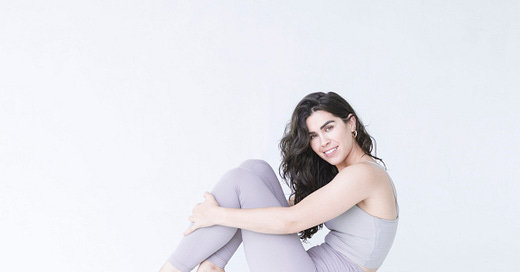In this bonus episode, anti-diet Pilates instructor Helen Phelan-Guillemot returns to discuss workout selfies, the way people respond on social media to images of her body, Christy’s own experience navigating other people’s opinions on social media, the lack of regulation in the fitness industry and why it’s a problem, how Helen is reexamining her relationship with beauty culture, and more.
Helen Phelan-Guillemot is a comprehensively certified pilates instructor, prenatal and postpartum corrective exercise specialist, Institute for Integrative Nutrition health coach, intuitive eating student, and founder of on demand pilates platform, Helen Phelan Studio with 10 years of experience. The HPS method was born because Helen was feeling frustrated about how social media portrayed wellness: one could either wholly reject exercise and athleticism, or reject their actual health and body image. Helen's intuitive pilates classes are known to be equal parts rigor and restoration to help you build strength, body awareness, while being kind to yourself. She won a Women's Health Magazine Fit Tech Award for "Best Body Neutral Workout" in 2021 and has been featured in InStyle, Bustle, Well and Good, Huffington Post and more. You can find her on IG/Tiktok @helenvphelan, on Substack writing Well Hell, or on helenphelanstudio.com to check out her anti-diet pilates classes.
Resources and References
Christy’s new book, The Wellness Trap: Break Free from Diet Culture, Disinformation, and Dubious Diagnoses and Find Your True Well-Being
Christy’s online course, Intuitive Eating Fundamentals
Jessica DeFino’s Substack, The Unpublishable
Subscribe on Substack for bonus content and more
Transcript
Disclaimer: The below transcription is primarily rendered by AI, so errors may have occurred. The original audio file is available above.
Christy Harrison: Hey there. Welcome to this bonus episode for paid subscribers of Rethinking Wellness. I'm Christy, and my guest today is anti-diet Pilates instructor Helen Phelan-Guillemot, who returns to discuss workout selfies, the way people respond on social media to images of her body, my own experience navigating other people's opinions of me on social media, the lack of regulation in the fitness industry, and why that's a problem, how Helen is reexamining her relationship with beauty culture and more.
Now, without any further ado, let's go to my conversation with Helen Phelan-Guillemot. Helen, thanks so much for coming back for a bonus episode. Really excited to talk with you more.
Helen Phelan-Guillemot: Of course, I'm known to be a talker, so this is great.
Christy Harrison: I love talkers. I'm one too, why I do a podcast. But yeah, I was so excited to kind of pick up some of the threads that we talked about on the main episode where we kind of left off was talking about clothes, workout clothes, and I mentioned that you've written about workout selfies and kind of the way that people respond on social media to images of your body. So I'd love to talk a little bit about that.
Helen Phelan-Guillemot: Yeah, actually, one of the things that was sort of disorienting when I first started posting stuff online is I would get a lot of messages from people being like, your body's so relatable, or Your body is so attainable. And at first I felt offended, so I was like, oh, I'm not doing this to be attainable, but also I recognize that I have muscular person and maybe people are used to seeing a tall, thin model doing Pilates, and there's so much in that of having to work through what your feelings are about knowing that you are an acceptable level of different, and actually, Jessica Dino did a thread in one of her newsletters about the compromises we make to feel close to the beauty standard. Like, oh, it's okay if my teeth are crooked as long as they're white, or I can love my small boobs because I have a big butt, sort of like the rationalization that we make, and we think that that's freeing us from the beauty standard, but we're still clinging to an aspect of it.
So that was a lot of overanalyzing when I first started. At the same time, it was really cathartic in a way to post myself moving, especially because in a lot of Pilates exercises, you're curling and rounding and articulated and your skin moves, it folds, and that was a bit revolutionary for me to be okay with posting in the beginning. But I think moral of the story is don't comment on people's bodies regardless of what's going on, especially because even one of those tall, thin models that we idealize, so could be going through a health issue or depression or an eating disorder, there's a lot at play with health. And yeah, the whole body checking thing too that I wrote about, I posted a video on TikTok where I'm walking on my little walking pad and I'm making a sort of glaring expression. It was one of those trends, I forget exactly what the context of the video was, but someone was like, oh, it was me glaring at the idea of someone posting what I eat in a day video while body checking.
And someone was like, you're literally body checking in this video. And I was like, I mean, I understand the sensitivity to seeing that or being triggered by thinking that's what you're seeing, but there's also a difference between being able to look at your body or exist in your body on camera and examining and fixating on a body. And it's subtle. It's one of those things going back to our episode where maybe you can't look at your reflection while you're working out because you start to pick at things. Maybe you need to not have a mirror around for a while until you get comfortable just feeling the movement in your body. But it was also, yeah, that was a wild experience to be told. I was body checking when I've done a lot of work to be able to look at myself in the mirror and not immediately think those thoughts. I also think that people do a lot of projecting on the internet, so that's tough to navigate too.
Christy Harrison: And I've come to learn that I very much don't need to take in other random people on the Internet's opinions of me. That's just going to lead to destruction of my own mental wellbeing and has in some ways, to be quite honest, I'm clawing myself back from sort of a crisis of confidence that I went through a year ago or so.














